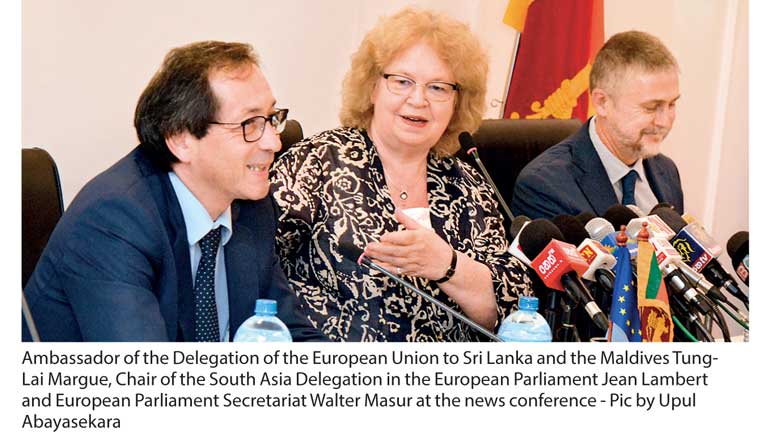Monday Feb 16, 2026
Monday Feb 16, 2026
Friday, 3 November 2017 00:00 - - {{hitsCtrl.values.hits}}

By Chathuri Dissanayake
The visiting European Union Parliamentary Delegation yesterday expressed its “disappointment” over the Sri Lankan Government’s failure to come through on commitments given over the repeal of the Prevention of Terrorism Act (PTA) and criminal law.
Delegation chair Jean Lambert raised serious concerns over a lack of progress on changing the laws, warning that the shortcomings would be noted by the European Parliament.
“We are very disappointed to see that we have still not got change on the statutes,” she said while speaking at a news conference.
Stressing that the Sri Lankan Government gave assurances that there would be “rapid changes” in repealing the controversial act, which allows law enforcement authorities to detain individuals without charging them for long periods of time, Lambert said they were under the impression that the Government was keen to repeal the current act to replace it with laws complying with international standards.
“The assurances were that it would be done. That was coming from the highest levels. That the new counterterrorism act we were told would meet the international standards, we were told that was why they are engaging with the United Nations, and the week after I visit was when the UN experts were coming to discuss it. So we were under the impression that it was going to be a rapid change.”
Visiting UN missions have also highlighted the lack of progress in repealing the PTA. According to the figures given by the UN Special Rapporteur on counter-terrorism and human rights, Ben Emmerson, who visited the country in July, there are 81 prisoners held without a charge under the PTA, of whom 70 had been in detention without trial for over five years and 12 had been in detention without trial for over 10 years. Recent demonstrations in Jaffna during President Maithripala Sirisena’s visit to the North prompted him to assure the Tamil community to look for solutions for the issue with Opposition and TNA Leader R. Sampanthan.
Lambert also said that although the EU Parliament did not officially raise objections against reinstating preferential trade conditions to Sri Lanka, a number of concerns remained regarding the commitment of the country to the 27 international conventions that GSP+ was tied to.
“We did raise a number of concerns on a number of issues because our feeling was there was obviously a change of mood in the Government with the 2015 elections but there were still a number of things that needed to happen in order to see progress in the 27 international conventions the GSP+ covers,” she said.
Lambert also said that the EU would be closely monitoring Sri Lanka’s progress over commitments made to the United Nations, noting that the lack of progress in the accountability process was a concern. She also noted that the UN had imposed timelines on achieving the goals, which the EU Parliament would also take into consideration.
However, the delegation also noted that there had been positive developments “with clear declaration of intent” in terms of labour rights and implementing conventions related to the environment.
“The action plans have been drawn up. The next evaluation is on taking action,” she said.
The EU delegation will also monitor if the GSP+ benefits also reach the grassroots level, Lambert stressed, adding that the results of the benefit will be properly visible after a year of receiving the benefit. However, the Government has informed the delegation that results were already visible in terms of export volumes.
The EU also encouraged the Government to diversify products.
“We want the Government to diversify into more markets and diversify the products and services that they are selling. When the Minister of Finance said there is an increase it was in the traditional markets. The real challenge is in diversification into more products and countries,” she said.